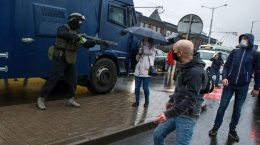On August 9, 2021, journalists of the Austrian ORF TV channel disappeared in Minsk. Despite all the assurances of the police and state propaganda that this was not true, the representative of the Ministry of Foreign Affairs in Vienna confirmed this information. The whereabouts of the journalists are unknown to this day. And the worst thing is that representatives of the Austrian media are not the first foreign journalists to suffer at the hands of Lukashenka. Today we will talk about how the illegitimate government of Belarus persecuted wordsmiths from other countries.
Before the events of 2020-2021, the most severe repressions against journalists (both Belarusian and foreign) were in 2011. Then several criminal cases were opened against the journalists. There are 167 known cases of short-term detentions, seven cases of physical violence. According to the latest report of the Reporters Without Borders organization, which appeared on August 12, 2021, Belarus retains the status of the most dangerous country in Europe for the work of journalists. During the year, about 500 media workers were detained in our country, 29 of whom are still in prison. During arrests and in police stations, the security forces often treated detained media representatives extremely harshly. Almost 70 cases of violence and torture against journalists in prisons have been documented. Among these figures, there are also cases of brutal reprisals against employees of foreign media.
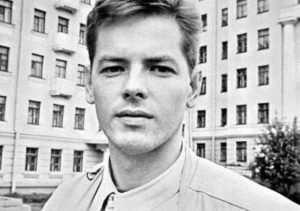 Meanwhile, the disappearances and repressions of foreign journalists began in Belarus long before the 2020 elections. On July 7, 2000, Dmitry Zavadsky, a journalist of the Russian ORT TV channel and a former employee of Lukashenko’s presidential pool, was abducted in Minsk. He disappeared at the Minsk-2 airport, where he went to meet his colleague from Belarus, Pavel Sheremet. However, Pavel and Dmitry never met, and Zavadsky’s car was found empty in the parking lot. The body of Dmitry Zavadsky has not yet been found, and in 2003 the court declared him dead. It is interesting that Dmitry Zavadsky and Pavel Sheremet made material about smuggling on the Belarusian-Lithuanian border. During the report from the border checkpoint, they were detained. Zavadsky was sentenced to one and a half years in prison.
Meanwhile, the disappearances and repressions of foreign journalists began in Belarus long before the 2020 elections. On July 7, 2000, Dmitry Zavadsky, a journalist of the Russian ORT TV channel and a former employee of Lukashenko’s presidential pool, was abducted in Minsk. He disappeared at the Minsk-2 airport, where he went to meet his colleague from Belarus, Pavel Sheremet. However, Pavel and Dmitry never met, and Zavadsky’s car was found empty in the parking lot. The body of Dmitry Zavadsky has not yet been found, and in 2003 the court declared him dead. It is interesting that Dmitry Zavadsky and Pavel Sheremet made material about smuggling on the Belarusian-Lithuanian border. During the report from the border checkpoint, they were detained. Zavadsky was sentenced to one and a half years in prison.
The initial version of the investigation was that Zavadsky had been kidnapped by former officers of the Interior Ministry’s special unit Almaz, Valeriy Ignatovich and Maxim Malik. Perhaps Ignatovich could take revenge on Zavadsky for getting into the material about the war in Chechnya, where he fought on the side of the separatists. They found a shovel with traces of the journalist’s blood and sentenced him to 10 years in prison, although Ignatovich did not admit his guilt. But then the disappearance of Zavadsky began to be associated with the “death squads” involved in the disappearances of Lukashenko’s opponents: Viktor Gonchar, Yuri Zakharenko, Anatoly Krasovsky. Pavel Sheremet argued that the death squads were headed by Dmitry Pavlichenko, colonel, commander of a special purpose brigade of the Interior Ministry troops. In 2019, the same was confirmed in a documentary from Deutsche Welle. Dmitry Pavlichenko still serves, he took part in dispersing the protests in August 2020.
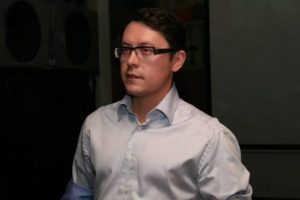 On June 28, 2003, Pavel Selin, head of the NTV bureau in Minsk, was deported from Belarus and banned from entering the country for five years. Pavel did a report on the funeral of the famous writer Vasil Bykov, but the authorities saw it as “false and provocative information”. In addition, Pavel Selin covered the actions of the Belarusian opposition. On July 8, 2003, by the decision of the Belarusian government, the NTV bureau was closed.
On June 28, 2003, Pavel Selin, head of the NTV bureau in Minsk, was deported from Belarus and banned from entering the country for five years. Pavel did a report on the funeral of the famous writer Vasil Bykov, but the authorities saw it as “false and provocative information”. In addition, Pavel Selin covered the actions of the Belarusian opposition. On July 8, 2003, by the decision of the Belarusian government, the NTV bureau was closed.
On July 23, 2004, the Ministry of Foreign Affairs of Belarus announced the termination of the activities of the representative office of the Russian VGTRK in the country. The Moscow correspondent of the All-Russian State Television and Radio Broadcasting Company (VGTRK) released a story about the opposition rally in Minsk two days earlier. Official Minsk considered that the number of participants in the action was several times overstated in this report. Four employees of the bureau of the TV company: editor Andrei Kochura, journalist Irek Murtazin, cameraman Sergei Pushkin and driver Oleg Piletsky were deprived of their accreditation.
On August 14, 2009, the journalists of the “Emergency” program of the NTV channel Alexei Malkov and Yuri Babenko arrived in Minsk to shoot a documentary about the disappeared opposition politicians and journalists. They managed to record an interview with Viktor Gonchar and Dmitry Zavadsky’s mother. And the next day, the journalists were evicted from the hotel where they lived and accused of working on the territory of the country without the mandatory accreditation of the Ministry of Foreign Affairs. On the same day, Alexei Malkov and Yuri Babenko were sent to Russia.
 On May 30, 2011, police detained Rodion Marinichev, a special correspondent for the Russian Dozhd TV channel. The next day he was deported from the country due to lack of accreditation. In Minsk, Rodion Marinichev recorded an interview with the wife of the former candidate for the presidency of Belarus in the 2010 elections Andrei Sannikov, Irina Khalip. The journalist also captured the queues at exchange offices and shops in the country after the devaluation of the Belarusian ruble. During the arrest, the security forces confiscated his camera and deleted the recording of the interview, and Marinichev himself was banned from entering the country for five years.
On May 30, 2011, police detained Rodion Marinichev, a special correspondent for the Russian Dozhd TV channel. The next day he was deported from the country due to lack of accreditation. In Minsk, Rodion Marinichev recorded an interview with the wife of the former candidate for the presidency of Belarus in the 2010 elections Andrei Sannikov, Irina Khalip. The journalist also captured the queues at exchange offices and shops in the country after the devaluation of the Belarusian ruble. During the arrest, the security forces confiscated his camera and deleted the recording of the interview, and Marinichev himself was banned from entering the country for five years.
On October 26, 2011, the journalist of “Moskovsky Komsomolets” Igor Karmazin was deported from Belarus, who was preparing an article about the Belarusian opposition. The deportation was explained by the fact that Karmazin did not have accreditation, as required by the Belarusian legislation. Igor Karmazin was banned from entering the territory of the republic for a year.
On May 6, 2020, the Ministry of Foreign Affairs of Belarus revoked the accreditation of the employees of the Russian First Channel Alexei Kruchinin and the operator Sergei Panasyuk. They have prepared a material on the spread of the coronavirus in Belarus. The press secretary of the Belarusian Foreign Ministry Anatoly Glaz announced that the decision to revoke the accreditation was made “in connection with the dissemination of information that does not correspond to reality.” The Russian First Channel, in turn, noted that the actions of the Belarusian authorities are absolutely groundless.
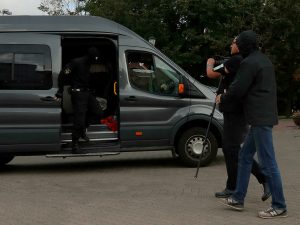 On July 14, 2020, Viktor Babariko and Valery Tsepkalo were not registered as presidential candidates in Belarus in the upcoming elections. On this occasion, large-scale protests began in the Belarusian streets in the evening, during which dozens of people, including journalists, were detained. The BBC operator Andy Smythe turned out to be in the police department – later in the evening he was released.
On July 14, 2020, Viktor Babariko and Valery Tsepkalo were not registered as presidential candidates in Belarus in the upcoming elections. On this occasion, large-scale protests began in the Belarusian streets in the evening, during which dozens of people, including journalists, were detained. The BBC operator Andy Smythe turned out to be in the police department – later in the evening he was released.
In August 2020, dozens of foreign media representatives were detained. On August 7, even before the elections, three journalists of the Nowadays TV channel, registered in Prague, were expelled from Belarus. Citizens of Ukraine Iryna Romaliyskaya and Ivan Grebenyuk, as well as Russian citizen Yuri Baranyuk, fell under repression. All of them covered the situation in Belarus and the elections. The journalists were accused of working without accreditation – the channel’s representatives asked for it long before the elections, but the Belarusian authorities refused them. Media workers were deported to Ukraine and banned from entering Belarus for 10 years.
On August 9, people in civilian clothes attacked employees of the Russian Rain TV channel, correspondents Vladimir Romensky and Vasily Polonsky, as well as cameraman Nikolai Antipov. They were released on August 10 and sent to Smolensk.
On the same day, two employees of the Russian RT channel were detained: Sergei Kamenetsky and Alexander Kovalev, who were covering the work of polling stations in Belarus. There was no connection with journalists for four days. After their release, they were also sent to Russia.
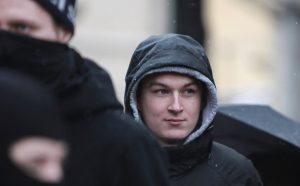 On August 10, Maksim Solopov, a special correspondent for Meduza, went missing in Minsk. On Volodarskogo Street, he reported that the police blocked the protesters and used tear gas against them, resulting in many of them being taken to police vans. Then the connection with him was interrupted. On August 11, it became known that he was handed over to the employees of the Russian consulate. He had a slight head injury.
On August 10, Maksim Solopov, a special correspondent for Meduza, went missing in Minsk. On Volodarskogo Street, he reported that the police blocked the protesters and used tear gas against them, resulting in many of them being taken to police vans. Then the connection with him was interrupted. On August 11, it became known that he was handed over to the employees of the Russian consulate. He had a slight head injury.
Maksim Solopov’s colleagues were also detained on August 10: Daily Storm journalists Anton Starkov and Dmitry Lasenko, Russian war correspondent and founder of the WarGonzo project Semyon Pegov, his cameraman Vladislav Zizdok, RIA Novosti photo correspondent Ilya Pitalev and Nikita Telizhenko, a correspondent for the Yekaterinburg-based Znak.com. Nikita later said that the riot police beat the detainees both in the police van and in the district department, abused them and forced them to sing the Belarusian national anthem.
The authorities responded to the detention of Russian journalists. Russian Foreign Ministry spokeswoman Maria Zakharova called the actions of the Belarusian security forces “not fraternal” and noted that many of the detained journalists had previously requested accreditation to work in Belarus but were refused. Foreign Minister Sergei Lavrov said that Moscow will seek an early settlement of the situation with the Russian journalists detained in Belarus during the dispersal of protest actions.
On August 11, in Minsk, security forces attacked three journalists from the BBC channel. They had accreditations issued by the Ministry of Foreign Affairs of Belarus, as well as identification vests and certificates. The police snatched the camera from the journalists’ hands and tore their certificates, but they did not detain the journalists themselves.
On August 12, 2020, it became known about the arrest of two Ukrainian journalists: Konstantin Reutsky (Hromadske Television) and Yevgeny Vasiliev. According to the press secretary of the Ministry of Internal Affairs Olga Chemodanova, Ukrainian journalists were not accredited in Belarus. She promised to release the media staff as soon as possible. The release of the media representatives was handled by the Ukrainian Embassy in Belarus.
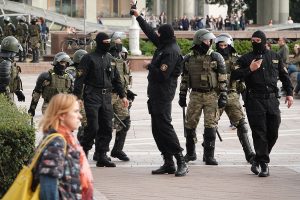
On August 27, 2020, at another protest rally in Belarus, representatives of several foreign media were detained: Vasily Fedosenko and Vladimir Kostin (Reuters), Dmitry Lovetsky (AP), Sergei Bobylev (TASS). Among the detainees were also members of the film crew of the German public-legal television channel ZDF, the AFP and RIA Novosti agencies, the Lenta.ru publication and the BBC channel. The police explained the detention of the media by the need to check the documents. This was also confirmed by the press secretary of the Ministry of Internal Affairs Olga Chemodanova: “The journalists were taken (not detained!) To the Oktyabrsky police department of the city of Minsk to check the documents confirming the legality of their professional activities”. It is known that journalists were asked to show their phones, but they refused. Later, the media workers began to be released.
On August 29, 2020, it became known that journalists from several foreign media were deprived of their accreditation in Belarus. The Foreign Ministry revoked work permits from journalists of the German company ARD Ilya Kuznetsov, Sergei Sergeev and Mikhail Fomin, Reuters correspondents Vasily Fedosenko and Vladimir Kostin, AFP employees Sergei Gapon and Alexander Grabenkin, as well as Gennady Sharipkin from RFI, Tatyana Melnichuk and Tatyana Yanutsevich from BBC. In total, 19 representatives of foreign media were deprived of their accreditation. According to the deputy chairman of the Belarusian Association of Journalists Boris Garetsky, such a decision was made by the interdepartmental commission on countering extremism.
On October 2, 2020, the Ministry of Foreign Affairs of Belarus announced the cancellation of the accreditation of foreign journalists. The accreditations were revoked from the staff of the Radio Free Europe / Radio Liberty media corporation Oleg Gruzdilovich, Ales Dashchinsky, Vladimir Gridin and Alexandra Dynko. The list also included employees of ARD TV channel, Reuters agency, AFP agency and French radio RFI.
In January 2021, during a meeting of the UN Security Council, The Times journalist Gareth Brown spoke about his work in the 2020 presidential elections in Belarus. A media employee was detained, beaten in custody, and then deported from the country. Gareth Brown added that, while working in Belarus, he changed his place of residence every day, fearing that the security forces would find him. According to him, he has not seen such violence as in Minsk in half of the countries where there are military conflicts.
 On January 31, 2021, a correspondent for the Swiss public television SRF Luzia Tschirky was detained in Minsk. When she was walking to a meeting with her friend, a minibus pulled up next to her, and unidentified masked persons dragged her inside. Luzia Tschirky had a valid accreditation from the Ministry of Foreign Affairs. Her husband and friend were also detained. Swiss Foreign Minister Ignazio Cassis wrote on Twitter: “We were perplexed to learn that our correspondent was detained in the middle of the street without an explanation, and we condemn this action by the Belarusian authorities in the strongest possible terms. However, now we are also very happy that after the intervention of the Swiss Embassy in Belarus, Luzia Tschirky is free again”.
On January 31, 2021, a correspondent for the Swiss public television SRF Luzia Tschirky was detained in Minsk. When she was walking to a meeting with her friend, a minibus pulled up next to her, and unidentified masked persons dragged her inside. Luzia Tschirky had a valid accreditation from the Ministry of Foreign Affairs. Her husband and friend were also detained. Swiss Foreign Minister Ignazio Cassis wrote on Twitter: “We were perplexed to learn that our correspondent was detained in the middle of the street without an explanation, and we condemn this action by the Belarusian authorities in the strongest possible terms. However, now we are also very happy that after the intervention of the Swiss Embassy in Belarus, Luzia Tschirky is free again”.
 On March 27, 2021, Nicholas Connolly, an accredited correspondent of the German newspaper Deutsche Welle in Minsk, who is a German citizen, was detained. He covered the protests in Belarus that day. The journalist was wearing a blue vest with the words “Press”, but the police officers asked him for his documents anyway. He presented a passport of a German citizen and an official accreditation of a journalist at the Belarusian Foreign Ministry. He spent about five hours in the police department. In the police station, Nicholas Connolly was interviewed by a Belarusian KGB officer engaged in ideological work, asking questions about his biography and the study of the Russian language. The journalist was released thanks to the assistance of the FRG ambassador to Belarus. The security forces forced Nicholas Connolly to unlock his mobile phone and show the photos he had taken in the presence of the ambassador. Prior to that, Nicholas was detained on March 25, 2021 – according to him, it seemed to him that the police officers could not believe that his journalistic accreditation was genuine.
On March 27, 2021, Nicholas Connolly, an accredited correspondent of the German newspaper Deutsche Welle in Minsk, who is a German citizen, was detained. He covered the protests in Belarus that day. The journalist was wearing a blue vest with the words “Press”, but the police officers asked him for his documents anyway. He presented a passport of a German citizen and an official accreditation of a journalist at the Belarusian Foreign Ministry. He spent about five hours in the police department. In the police station, Nicholas Connolly was interviewed by a Belarusian KGB officer engaged in ideological work, asking questions about his biography and the study of the Russian language. The journalist was released thanks to the assistance of the FRG ambassador to Belarus. The security forces forced Nicholas Connolly to unlock his mobile phone and show the photos he had taken in the presence of the ambassador. Prior to that, Nicholas was detained on March 25, 2021 – according to him, it seemed to him that the police officers could not believe that his journalistic accreditation was genuine.
As noted in the latest report of Reporters Without Borders, a free press is Alexander Lukashenko’s main enemy. That is why even foreign viewers should not know about repressions, violence against civilians, prohibitions to dress in white and red clothes, glue white sheets of paper on windows and read protest Telegram channels. However, the point of no return is already far behind, and now Belarusians are unlikely to be forced to read, watch, and listen to “honest” state media.





